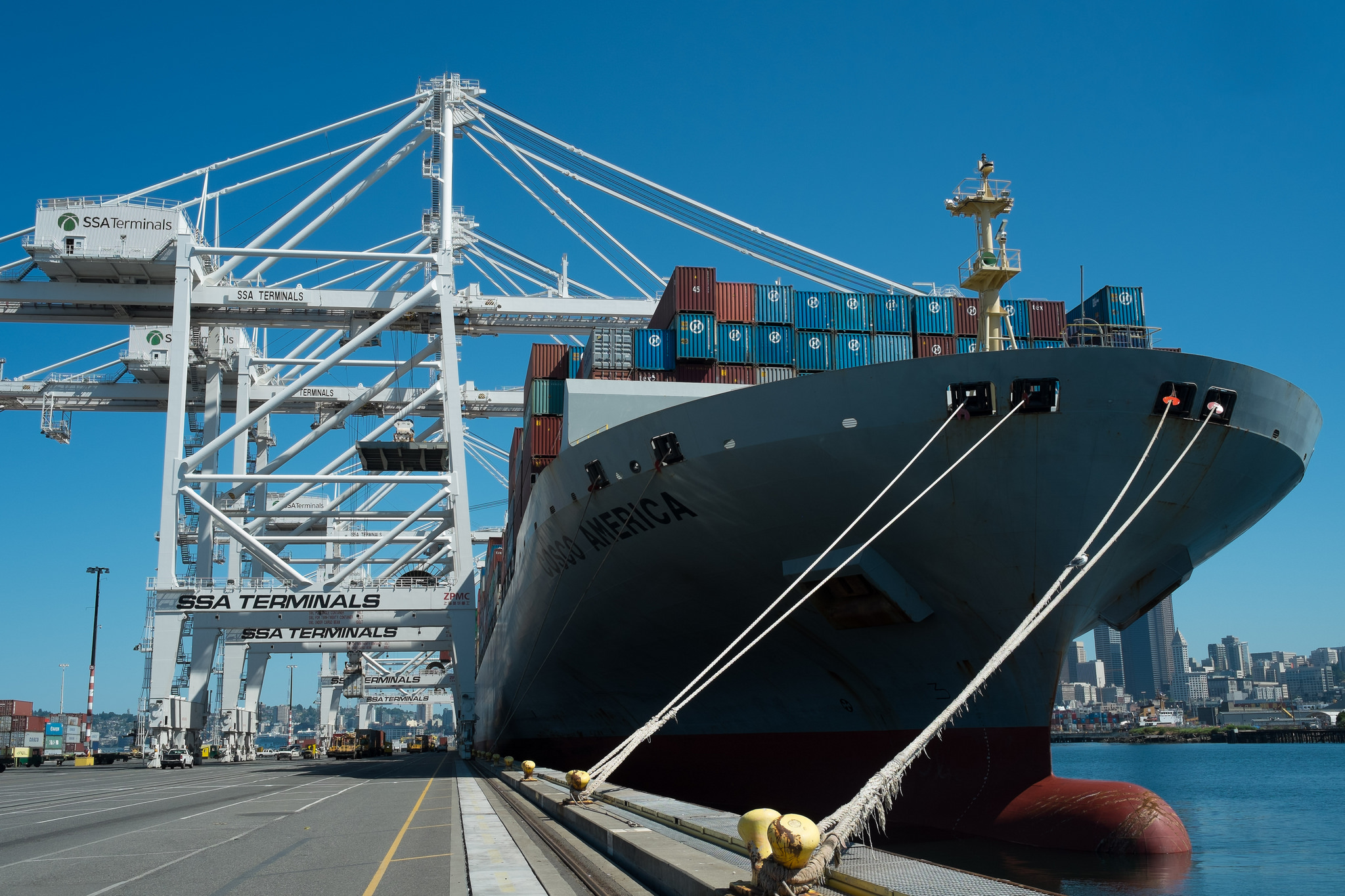 |
|
A COSCO North America ship is docked at the Port of Seattle in July. PROVIDED TO CHINA DAILY |
A possible merger between two of China's largest shipping companies could coincide seamlessly with a new alliance between the ports of Seattle and Tacoma in Washington state.
 |
Earlier this month, the Northwest Seaport Alliance was formed to help the ports of Seattle and Tacoma “unify management of our marine cargo facilities and business to strengthen the Puget Sound gateway and attract more marine cargo and jobs for the region”, the alliance website says. Two-way international trade at the ports was worth more than $73 billion in 2014.
“A potential merger (of the Chinese companies) could be seen as an example of how effi - ciencies might be achieved by combining assets and resources of the two companies,” Tara Mattina, communications director for The Northwest Seaport Alliance, wrote in an e-mail to China Daily.
“For several years now, we have seen shipping lines form mega alliances, looking for opportunities to become more effi cient. That is the same competitive pressure that led the ports of Tacoma and Seattle to form The Northwest Seaport Alliance.
“The formation of the NWSA gives us the opportunity to react more nimbly to these types of changes as business moves among terminals at both the Seattle and Tacoma harbors,” Mattina said.
West Coast ports were aff ected by a 2014 slowdown stemming from a contract dispute between the dockworkers union and the ports’ operators.
The dispute offi cially ended in May when the International Longshore and Warehouse Union ratified a five-year contract after agreeing to a tentative deal in February.
“All of the ports on the US West Coast felt pain during the labor contract negotiations, but the ports of Seattle and Tacoma recovered quickly,” Mattina said.
A story on Tuesday in the Puget Sound Business Journal suggested that if the two Chinese shipping companies merge, it could drain business from the Port of Seattle if the merged company were to choose Tacoma as its port of call instead of Seattle, where both companies operate now.
“We have no way of knowing what the shipping lines might do at this point,” said Mattina, who disputed the story. “Also, the two ports operate jointly under The Northwest Seaport Alliance and, as such, will share equally in the container revenue regardless of which harbor shipping lines call. The alliance was set up that way to eliminate competition between the two ports.”
The merger in China was hinted at in a regulatory fi ling on Aug 7, and trading in the shares of the two companies was halted on Aug 10.
Ship.sh, a Shanghai-based shipping industry news website, reported that the two shipping companies planned to set up a reform committee to discuss a joint-restructuring plan to be submitted to the government within three months.
The suggestion of the merger and potentially that of other state-owned firms sent stocks almost 5 percent higher on the Shanghai Stock Exchange on Aug 10. The merger would also make fi nancial sense, as the two carriers have $911 million in operating losses from container operations the past fi ve years, according to freightweek.com, which covers global logistics. Dong Liwan, a shipping industry professor at Shanghai Maritime University, said the two companies merging could jumpstart SOE reform.
The State Council recently approved a blueprint to overhaul the SOE sector, aimed at optimizing China’s industrial resources.
“Denmark’s Maersk Line and Switzerland’s Mediterranean Shipping Co SA formed their 2M alliance last year to off set lower volume growth and overcapacity in the industry,” Dong said. “The planned merger of these two Chinese shipping giants would be equally practical in helping them compete against some well-established rivals on many overseas shipping routes.”
Yin Zhen, deputy-director of transport planning at the Institute of Comprehensive Transportation, said that if the two companies merged they would become an entity with 1.3 million TEUs (20-foot equivalent units) of capacity.
“This would put it in fourth place, closely behind the world’s third-largest container line, CMA-CGM Group of France, in terms of global share and ranking,” Yin said.
However, Yin said a merger would involve major eff ort and resources, as the two Chinese shipping companies operate more than 140 separate shipping, port, shipbuilding and finance divisions throughout the world, including subsidiaries and branch offi ces in the United States.
Contact the writer at williamhennelly@chinadailyusa.com